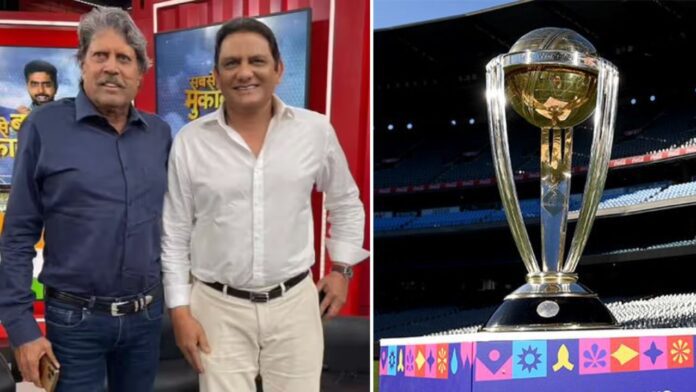India and Australia have met 12 times in the ICC Men’s Cricket World Cup, a record for any pair of countries in the tournament’s 12-edition, 48-year history. Australia has won eight games and lost four. The teams did not meet in 1975 or 1979, but with the exception of 2007, they met in the next ten World Cups.
1983, Trent Bridge: Australia won by 162 runs
Player of the Match: Trevor Chappell
After two unsuccessful World Cups, India began 1983 on a high note, with victories over the West Indies and Zimbabwe. Trevor Chappell (110) and Ken Macleay (6-39) put an end to the journey. India’s lone consolation was Kapil Dev’s 5-43, the country’s first ODI five-wicket haul.
1983, Chelmsford: India won by 118 runs
Player of the Match: Roger Binny
India needed to win the rematch to advance to the semifinals. They only made 247, but Roger Binny (4-29) stepped up to the plate and swiftly reduced Australia to 52-4. Madan Lal (4-20) completed the scoring, and India won by 118 runs. They went on to win the semifinals and final, with Binny finishing as the World Cup’s highest wicket-taker.
1987, Madras: Australia won by 1 run
Player of the Match: Geoff Marsh
Replays suggested that a four awarded to Dean Jones was a six when Australia made 268-6. Kapil agreed, and the score was changed to 270-6. Despite Navjot Sidhu’s explosive maiden innings (he struck five sixes in his 73), India lost by a run. Steve Waugh bowled Maninder Singh with two runs needed in two balls. What if Kapil had refused?
1987, Delhi: India won by 56 runs
Player of the Match: Mohammad Azharuddin
India exacted their vengeance in grand manner. As a team, they outscored their opponents 289-6. Mohammad Azharuddin followed his 45-ball 54 not out with 3-19 after Maninder bowled superbly for 3-34.
One of Azharuddin’s catches came in second place in the inaugural Bush Great Catches Contest.
1992, Brisbane: Australia won by 1 run
Player of the Match: Dean Jones
Jones scored 90 points in Australia’s 237-9 victory. It began to rain when India was 45-1 after 16.2 overs, and the target was reduced to 236 in 47 overs. Azharuddin scored 93 once more, with Sanjay Manjrekar (47 in 42 balls) providing support. India needed four points off the final ball. As the Indians attempted for the third run, Steve Waugh lost the catch, but his throw found Venkatapathy Raju short.
Read More: The Top 10 Players to Watch at the 2023 ICC World Cup
1996, Bombay: Australia won by 16 runs
Player of the Match: Mark Waugh
Mark Waugh’s 126 made him the first man in World Cup history to reach hundreds in consecutive innings, but Australia crumbled miserably. Waugh was among their five run outs, and their final four wickets all fell at 258. Sachin Tendulkar then scored an 84-ball 90 in the first day-night ODI in his birthplace, while Manjrekar, another local star, made 62. Waugh came to the fore once more, bowling a wide to stump Tendulkar. The Indian chase had peaked.
1999, The Oval (Super Sixes): Australia won by 77 runs
Player of the Match: Glenn McGrath
Both teams needed to win this game in order to advance to the semifinals. Glenn McGrath effectively destroyed India’s chase after Mark Waugh’s 83 moved Australia to 282-6, taking out Tendulkar, Rahul Dravid, and Azharuddin with his first 20 deliveries. A 141-run partnership between Ajay Jadeja (100 not out) and Robin Singh (75) was insufficient.
2003, Centurion: Australia won by 9 wickets with 166 balls to spare
Player of the Match: Jason Gillespie
Tendulkar and Dravid went on the defensive after Brett Lee struck twice early on. They waved goodbye to McGrath and Lee, hanging on hard to add three in 35 balls. However, as Jason Gillespie (3-13) entered the game, India simply faded away and folded for 125.
Australia was victorious in 23 overs. It required a message from Tendulkar to appease the enraged fans at home.
2003, Johannesburg (Final): Australia won by 125 runs
Player of the Match: Ricky Ponting
Following the aforementioned defeat, India won eight consecutive matches to qualify for the final before running into Australia again. When they chose to bowl, Ricky Ponting (140 not out, 121 balls) and Damien Martyn (88 not out, 84 balls) blew them away.
How lopsided were the competitions? In the final, Australia scored 359-2. India scored 359 points in two World Cup matches against Australia in 2003.
2011, Ahmedabad (Quarterfinal): India won by 5 wickets with 14 balls to spare
Player of the Match: Yuvraj Singh
To advance to the semifinals, India needed to defeat Australia, which had won the previous three World Cups and had beaten India five times in a row.
India got off to a good start after Ponting’s 104 helped Australia to a 260-6 lead. They appeared to be on track at 94-1, but at 187-5, a sense of déjà vu began to afflict the Indian fans. Thankfully, Yuvraj Singh (57 not out) and Suresh Raina (34 not out) kept India from losing any more wickets. India won its second World Cup after two victories.
Read Also: Irfan Pathan Predictions in World Cup 2023: Top Batter and Top Bowler
2015, Sydney (Semifinal): Australia won by 95 runs
Player of the Match: Steve Smith
Until this encounter, India had bowled out and won every side in the 2015 World Cup. For the first time, the bowling crumbled here, as Steve Smith’s 93-ball 105 led Australia to 328-7. M.S. Dhoni’s run-a-ball 65 was never going to be enough after Indian openers Rohit Sharma and Shikhar Dhawan combined 76 in 77 balls, but as they fell and the asking rate increased, M.S. Dhoni’s run-a-ball 65 was never going to be enough.
2019, The Oval: India won by 36 runs
Player of the Match: Shikhar Dhawan
India avenged a World Cup defeat at the same location two decades ago. Following Rohit’s dismissal for 57, Dhawan (117 in 109 balls) and Virat Kohli (82 in 77 balls) kept India on top. Hardik Pandya, MS Dhoni, and K.L. Rahul then combined to propel India to 352-5.
During the game, some supporters booed Smith, who had just returned from a one-year suspension for ball-tampering. In the midst of the ‘cheater’ chants, Kohli approached the throng and asked them to calm down.
When Australia batted, David Warner (56) and Smith (69) reduced the target to 220 in 153 balls with nine wickets in hand, but regular strikes from Bhuvneshwar Kumar (3-50) and Jasprit Bumrah (3-61) halted them.
Read More: South Africa on Fire, Record Highest World Cup Total, Fastest Hundred, and Three Centurions



















![10 Countries With the Best Healthcare in the World [Statistical Analysis] Countries With the Best Healthcare in the World](https://articleify.com/wp-content/uploads/2025/07/Countries-With-the-Best-Healthcare-in-the-World-1-150x150.jpg)









